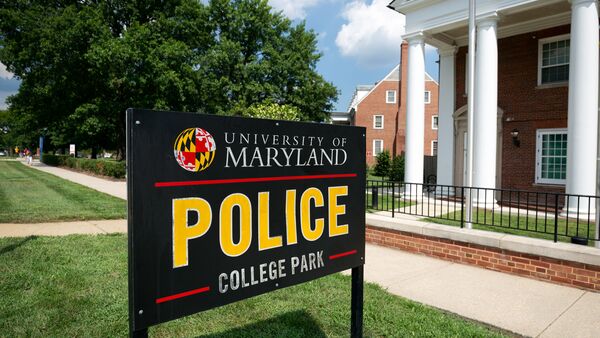Safety, Security, Accountability
From emergency preparedness and campus safety services to community standards and student conduct policies, we’re committed to fostering a safe, respectful, and accountable campus environment.

If you are on campus and you dial 911 from your cell phone, you will get Prince George’s County. Let them know you are on campus so they forward the call to UMPD. If you call 911 from a campus landline phone, you will get UMPD.
How can I notify the University of Maryland if I have a concern about my student?
Emergency Response (available 24/7)
University Police - 301.405.3333 (Non-emergency: 301.405.3555)
Counseling Center - 301.314.7651
University Health Center - 301.314.8184 (Mental Health Services: 301.314.8106) or health@umd.edu
(Note: All Health Care services provided to students are confidential.)
Note: Students can call from any campus building using the last 5 digits of any of the numbers above. For a full list of resources and contact information, please visit Terp Family’s Quick Reference Guide.
What resources are available to keep students safe?
- The Security Operations Center (SOC) operates 24 hours a day, seven days a week, 365 days a year, monitoring 500 exterior cameras, more than 1,400 cameras inside and outside of campus buildings, as well as at various locations around the city of College Park
- 300+ “Blue Light” or Public Emergency Response Telephones (PERT)
- SoundThinking (formerly ShotSpotter), which is acoustic gunshot technology
- Early Warning System
- Opt-in Safety Alerts via text/ email
- Police Escorts Opt-in Safety Alerts
- UID Only Accessibility
- UMD Guardian app

The UMPD is accredited through the Commission on Accreditation for Law Enforcement Agencies (CALEA). UMPD officers and dispatchers are trained specifically in the field of crisis intervention.
Teddy the Terp is the university’s comfort dog. Teddy provides aid and comfort to people, groups and communities impacted by stressors or traumatic events. (You can follow Teddy on Instagram at @teddytheterp).
MHEART is a collaborative team of licensed mental health clinicians and UMD police officers who respond to mental health crises on and around the University of Maryland, College Park campus. To learn more, visit https://counseling.umd.edu/mheart
What does UMD do to create an environment that is united, respectful, secure & safe, inclusive, accountable, and empowered & open to growth?
The Code of Student Conduct is enforced both on and off campus. It outlines the standards of behavior to which all students are expected to abide by while attending the university, including policies around alcohol and other drugs (including cannabis), hazing, free expression, and many others.
Students are actively encouraged to discuss any allegations of misconduct with their parent/guardian/family member(s), as the office is limited on what we can directly share regarding specific incidents (see FERPA Regulations). However, the Office of Student Conduct welcomes the opportunity to explain the process to individuals supporting their students. Additionally, students are provided contact information for the Offices of Undergraduate and Graduate Student Legal Aid for additional support in the process.
 All new students, faculty and staff participate in TerrapinSTRONG onboarding, which welcomes participants to the University of Maryland, introduces UMD history and traditions, and underscores our commitment to diversity, equity and inclusion.
All new students, faculty and staff participate in TerrapinSTRONG onboarding, which welcomes participants to the University of Maryland, introduces UMD history and traditions, and underscores our commitment to diversity, equity and inclusion.
UMD requires first year students to complete the "Sexual Assault Prevention for Undergraduates,” which is a 45-minute online sexual misconduct training course assigned to all first-year and transfer students at the beginning of their first and second semesters. This course is designed to help ensure that all incoming undergraduate students learn more about topics related to Title IX, civil rights, and the rights and resources available to them. This course also engages undergraduate students in fostering healthy relationships and prepares them to recognize and respond to sexual assault and harassment when it occurs.
Step UP! Bystander Intervention Training empowers audience members with the awareness skills and tools to help prevent harmful situations from occurring or escalating on our campus.
How to Talk to Your Student About Safety & Boundaries
Talking to your student about safety and boundaries is crucial for fostering their confidence, trust, and ability to maintain their safety.
- Teach consent: Help them understand the importance of saying "no" when they feel uncomfortable and respecting others' boundaries as well.
- Safe social media use: Discuss their social media use, helping them set boundaries on what they share and who they interact with.
- Respect in friendships and romantic relationships: Talk about what healthy, respectful relationships look like. Discuss the importance of mutual respect, consent, and personal boundaries in all relationships.
- Keep the lines of communication open: Make sure your student feels safe coming to you with questions or concerns. Let them know they can talk to you about anything, no matter how difficult it might seem.
- Listen actively: When your student shares concerns, listen with empathy and without judgment. Avoid reacting harshly or dismissing their feelings, which can make them hesitant to talk to you in the future.
- Be patient: Safety and boundary conversations are ongoing. They may need time to process and ask more questions.
- Discuss available resources at the university: Ensure your student knows and understands what resources are available at the university and how to access them, if needed.
Report Bias: go.umd.edu/ReportBias
Email: BiasSupport@umd.edu
Website | Location: 2417 Marie Mount Hall
What is Bias?
Bias Incident: an act of hate or harm targeted at an identity group or at an individual because of their assumed membership in a group.
Hate Crime: a criminal act (ex: theft, assault, vandalism) that is motivated by hate or bias towards an identity group or individual based on an assumed identity. Hate Speech: verbal speech that attacks, vilifies, or incites hatred against a person or group based on an identity. Such speech is often protected by the First Amendment.
Support
Bias Incident Support Services (BISS) offers support to those impacted by bias. If desired, BISS will reach out to offer space, resources, and additional support or reporting options to those who have been impacted. Support can be for individuals or communities. BISS is not a judicial or sanctioning body. BISS will not contact the alleged perpetrator or share any information about the reporter.
Advocacy
Bias Incident Support Services (BISS) is an advocate for community members who have been impacted by bias. By analyzing trends in bias reports, BISS makes recommendations for improving campus.
Email
Website | Location: 3101 Susquehanna Hall, 4200 Lehigh Rd.
(OCRSM) supports the University’s commitment to a working and learning environment free from discrimination and harassment. OCRSM oversees the institutional response to all reports of discrimination and harassment, including sexual misconduct, under the University of Maryland’s Policy and Procedures on Sexual Harassment and Other Sexual Misconduct and University of Maryland’s Non-Discrimination Policy and Procedures. OCRSM conducts fair and impartial investigations and adjudications of discrimination and harassment complaints. In addition, OCRSM facilitates supportive measures and provides sexual harassment and non-discrimination policy training and prevention and education outreach programs to the campus community.
How to file a report
If an individual believes they have experienced sexual misconduct or other forms of discrimination or harassment, we encourage them to make a report to OCRSM.
The OCRSM responds to all reports and complaints of discrimination and harassment, including sexual misconduct, and retaliation.
Report online at www.ocrsm.umd.edu
Call OCRSM at 301-405-1142 or email at titleixcoordinator@umd.edu
Office of Family Engagement - 301.314.8429 or terpfamily@umd.edu
Office of the Dean of Students - 301.314.8484 or deanofstudents@umd.edu
Vice President for Student Affairs - 301.314.8430 or studentaffairs@umd.edu
Family Warmline (therapist) - 301.314.7651
Behavior Evaluation and Threat Assessment (BETA) Team - 301.314.2382
Department of Resident Life - 301.314.2100 or reslife@umd.edu
Education Abroad - 301.314.7746 or educationabroad@umd.edu
Office of Student Conduct - 301.314.8204 or studentconduct@umd.edu
University Chaplains - 301-314-9866 or 301-314-9893 or chapel@umd.edu

The property that constitutes the University of Maryland, College Park campus is, by law, the primary jurisdiction of the University of Maryland Police Department (highlight in the green area). In this area, we respond to calls for service, investigate incidents of criminal misconduct and non-criminal misconduct, make arrests, direct and regulate traffic, and enforce Maryland traffic laws.
We have a concurrent jurisdictional agreement with the Prince George’s County Police Department (PGPD) (in the gray area). This agreement gives our officers jurisdiction in areas adjacent to the campus in the cities of College Park and Adelphi. However, when it comes to any kind of investigation within these areas off-campus, PGPD is the primary investigating agency.
Additional links:
- The Undocumented website is for current and prospective undocumented, first-gen, and immigrant students.
- Veteran Student Life
- Lesbian, Gay, Bisexual, Transgender (LGBT) Equity Center
- Nyumburu Cultural Center
